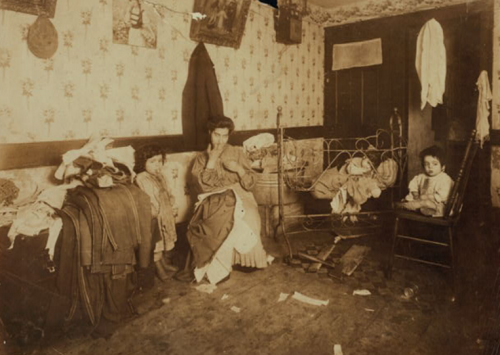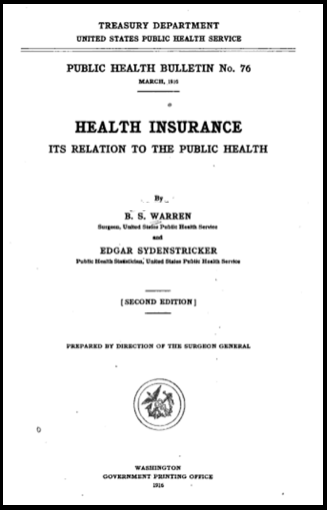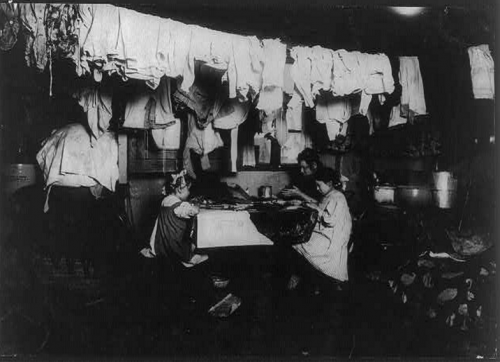Hellraisers Journal: Strain, overwork, and poverty sending millions of American workers to early graves.
Put on your fighting clothes.
-Mother Jones
Friday April 21, 1916
From the United Mine Workers Journal: Public Health and Poverty

Weak for want of food, by Lewis Hine.
``````````
This week's issue of the Journal contains an article by George P. West on a report, recently published by U. S. Public Health Service, which exposes the relationship between poverty and the health of American workers:
The Human Wrecks, the Result of
Present Day Industrialism(From George P. West,
Committee on Industrial Relations,
Washington, D. C.)Washington, April 16.
The United States Public Health Service has just published a startling expose of American industrialism and its blighting, death-dealing effect on the lives and happiness of the 30,000,000 American wage earners.
Strain and overwork in the shop and factory, poverty and anxiety at home, are breaking down the health of American workers and sending millions to their graves before they have approached old age.
All the platitudes of the political orator and the shallow patriot are swept aside by the facts of science as marshaled in Public Health Bulletin No. 76, entitled "Health Insurance, Its Relation to the Public Health." The authors are Dr. B. S. Warren, surgeon, United States Public Health Service, and Edgar Sydenstricker, public health statistician, in the same service. The bulletin embodies the result of an investigation undertaken for the Commission on Industrial Relations and continued for the Public Health Service. Copies may be had on application to the Government Printing Office in Washington.
The Warren-Sydenstricker report concludes with a plan for compulsory health insurance for wage earners, to be administered by the State and Federal Government. But its chief value and importance lies in the stunning indictment of American social and industrial conditions contained in its impressive array of indisputable facts and figures.
Proved Ten Times Over.By combing all the reports made by State and Federal investigators and those employed by reputable universities and societies during the past ten years, the Government experts have proved ten times over their contention that low wages are playing havoc with the lives and health of the workers.
After reading this Government report, no man or woman could longer fail to realize that preparedness means radical changes in the economic condition of the wage earners before it means anything else; that the losses on European battlefields and the danger of foreign aggression are less than the day-by-day slaughter being wrought here at home by our prevailing industrial and economic regime.
Supplementing this committee's estimate that 250,000 adults are killed and 4,700,000 wounded each year by poverty and preventable disease, the report finds that "each of the 30,000,000 workers in the United States loses on the average about nine days' every year on account of sickness alone."
How Poverty Kills.Having established the prevalence of disease among wage earners, the Government experts proceed to its causes and devote twenty-eight pages to what is in effect an indictment of American industry. The causes of disease are given as follows:
The occupational hazards of disease, irregularity of employment, un- healthful conditions of living, the employment of women in industry under modern conditions of work, particularly of married women, and the economic disadvantage at which a large proportion of wage workers and their families are placed as the result of low wages and insufficient annual income.
The report makes it clear that "economic disadvantage" is a cause of disease and overshadows all the rest, for example, inadequate diet is set down as the first of "unhealthful conditions of living," and the report says:
Income statistics published by Federal and State Governments in the last few years indicate that a considerable proportion of the families of wage workers have not been able to maintain a diet that will provide for proper nourishment.
A larger proportion can maintain an adequate diet only at the sacrifice of healthful environment and of other items which go to constitute a reasonable standard of living. There can be no doubt that nourishing food is sacrificed in a large number of instances in order to obtain some of the comforts and amusements and to gratify some of the wants which are entirely natural and to be expected of the average American.
Less Than Half Earn Enough.An examination of a number of studies of the budgets of American workingmen's families indicates that the point of adequate subsistence is not reached until the family income is about $800 a year. Less than half of the wage earner's families in the United States have an annual income of that size, according to all statistics of income for workingmen's families.
If this be true, over half of the families of American wage earners must either lower their standard of life in other respects in order to have an adequate diet or make sacrifices in their diet in order to secure healthful housing, favorable community environment and a few of the reasonable comforts.
The effect of the rapid increase in the retail prices of foods that have been found to constitute the diet of workingmen's families cannot be over looked as an additional factor in this connection. Between 1900 and 1913 the average increase in the retail prices of foods was about 60 per cent., according to statistics published by the Department of Labor. During the same period wages increased less than 30 per cent., according to the same authority.
It is clearly evident that the tendency during the period 1900-1913 has been toward an impoverishment of the diet of families with low incomes.
The report sums up the economic causes of disease:
No attempt to present the real meaning of the problem of health among wage workers and their families can be complete without taking into consideration their economic status—the wages they earn and the income which the wage earner's family is able to receive — and comparing it with those standards which have been agreed upon as reasonable and necessary for the maintenance of health.
Without taking into consideration the loss of working time for any cause it has been found that during recent years in the principal industries of the United States between one-fourth and one-third of the male workers of approximately 18 years of age and over earned less than $10.00 a week, and from two-thirds to three-fourths earned less than $15.00, and only about one-tenth earned more than $20.00 a week. In textile manufacturing and some other industries the wage level was much lower.
The wages of women workers were considerably lower than those of men. From two-thirds to three-fourths of women workers in factories, stores, laundries and in industrial occupations generally worked at wages of less than $4.00, and nearly one-half earned less than $6.00 a week.
But the workers are not allowed to earn even these amounts in every week of the year. The report says:
Tired children working in a tenement-home sweatshop, by Lewis Hine.
``````````A conservative estimate, based on all the available statistics of loss in working time, would appear to be that wage workers in the principal manufacturing and mining industries lost on the average from one-fifth to one-third of the full working time during a year from all causes.
One-Third Even Less Than $500.00.Statistics of total incomes of wage-workers' families point to the conclusion that the average total annual family income (including earnings of women and children) in the principal manufacturing and mining industries has been between $700 and $800 in recent years. This average, however, does not adequately depict the real situation, for the conclusion is also indicted that one in every ten or twelve workingmen's families had at the time of the investigations an annual income of less than $300 a year; that nearly a third had incomes of less than $500 and over one-half had in comes of less than $750 a year.
From the foregoing it is evident that underlying all other economic factors affecting the wage-earner's health is the fact of poverty. The other conditions that have been discussed—unhealthful living and working conditions, insecurity and irregularity of employment and income, inadequacy of earnings of heads of families and the necessity for earning of wages by mothers and children—these and other such conditions are but incidents of poverty.
Many pages could be filled with some of the more striking illustrations of how low wages kill and maim. The report describes the bad housing conditions due to meager incomes and the neglect by the community of the drainage and sanitation of districts where the underpaid workers live. It tells how the piecework system breaks down the health of the workers in the shops by causing strain and fatigue. It describes the effect of irregular employment and unemployment on the health of the victims. The entire pamphlet should be read by those who want a reservoir of facts about American industry.
Warren and Sydenstricker approach their subject purely from the stand point of the physician and not that of the economist. Yet they are entitled to the greatest credit for the intelligence and courage with which they have placed the responsibility for preventable deaths and disease where it belongs—on low wages.
-----[Photographs and emphasis added.]
SOURCE
The United Mine Workers Journal, Volume 25
Executive Board of the United Mine Workers of America,
Nov 11, 1915 to May 25, 1916
https://books.google.com/books?id=NQpQAAAAYAAJ
UMWJ of Apr 20, 1916
https://books.google.com/books/reader?id=NQpQAAAAYAAJ&printsec=frontcove...
"Human Wrecks" by George P. West
https://books.google.com/books/reader?id=NQpQAAAAYAAJ&printsec=frontcove...
IMAGES
Poverty, Weak for want of food, Hine, 1912
http://www.loc.gov/pictures/resource/nclc.04144/
Public Health, Warren & Sydenstricker, March 1916
https://books.google.com/books/reader?id=J3ELAAAAYAAJ&printsec=frontcove...
Poverty, Tenement Sweatshop, Tired children, Hine, 1912
http://www.loc.gov/pictures/item/ncl2004001089/PP/
See also:
Health Insurance: Its Relation to the Public Health
-by Benjamin S. Warren, Edgar Sydenstricker
U.S. Government Printing Office, 1916
https://books.google.com/books?id=J3ELAAAAYAAJ
Note: West was well known to the UMWA as the author of:
US Commission on Industrial Relations
Report on the Colorado Strike
-by George P. West
Washington, DC, 1915
https://books.google.com/books?id=xNAoAAAAYAAJ
Commission on Industrial Relations
https://en.wikipedia.org/wiki/Commission_on_Industrial_Relations
"A Statement of the Purposes of the Recently Formed
Committee on Industrial Relations" by George P West
From Pearson's Magazine of March 1916
https://books.google.com/books/reader?id=GEBWAAAAYAAJ&printsec=frontcove...
Hungry Ragged Blues - Aunt Molly Jackson
Lyrics:
http://www.folkarchive.de/ragged.html#1
I'm sad and weary, I've got the hungry, ragged blues.
Not one penny in the pocket to buy one thing I need to use.
I woke up this morning, with the worst blues I ever had in my life;
Not a bite to eat for breakfast, a poor coal miner's wife!
When my husband works in the coalmines, he loads a carload every trip;
Then he goes to the office at the evening to get denied of scrip.
Just because they took all he made that day to pay his mine expense,
A man that will work for just coal oil and carbide, he ain't got a stack of sense.
All the women in the coal camps are sitting with bowed down heads,
Ragged and bare-footed, and the children cryin' for bread.
No food, no clothes for our children, I'm sure this head don't lie;
If we can't get more for our labor we'll starve to death and die!
Don't go under the mountain, with a slate hangin' o'er your head;
And work for just coal oil and carbide, and your children cryin' for bread.
This mining town I live in is a sad and lonely place
Where pity and starvation is pictured on every face!
Some coal operators might tell you the hungry blues are not there.
They're the worst kind of blues this poor woman ever had.




Comments
Woah, JaeRae. I'm reading today's news in a 1916 paper. Sigh.
This is why progressives so need The Long Memory. When they're freaking out about today's headlines, it would help them to know that we've been here before and how it got beat last time. So that we can beat it again this time. Light a candle, instead of shouting at the darkness.
Resilience: practical action to improve things we can control.
3D+: developing language for postmodern spirituality.
Things haven't changed much, have they?
The life of the poor is nasty, brutish, and short.
I was a virgin bride [the last in the nation] but still wound up raising my daughter by myself. I fully understand why some women put up with a whole lot of X&$# in order to get help in feeding their children.
The "common wisdom" in poor neighborhoods is that the children may do okay but the women don't have long lives. They usually kick off in their early 60s.
Life is strong. I'm weak, but Life is strong.
I was a single mother also, featherdsprite
wasn't easy, had a good paying union job for some of those years, but worked with all men, that wasn't easy either.
The daily grind can really grind ya down. For some, the only rest is in an early grave.
Never be deceived that the rich will allow you to vote away their wealth.-Lucy Parsons
Single Dad here... but I'm lucky to have a pension.
Still tough, but at least I have a volunteer job I feel GOOD about.
Wish that good work could be something you could live on, but sometimes it seems that unless you're conning people in some way, you won't earn a living wage.
I do not pretend I know what I do not know.
From a conversation with an
From a conversation with an Ivory Tower type a long time ago:
Through circumstances owing to my complete and utter alienation and its consequent mental problems, I didn't get to become a Union Ironworker apprentice until I was 46. (Effectively, the oldest in the Local - ever.)
The effects of irregular employment meant that after 13 years, I'd only accrued 6 years vested for my pension.
So you see, even that pony is rather small.
Improve the Resilience Resource Library by adding your links.
Vote Smart - Just the Facts - 40,000 politicians by name or zipcode